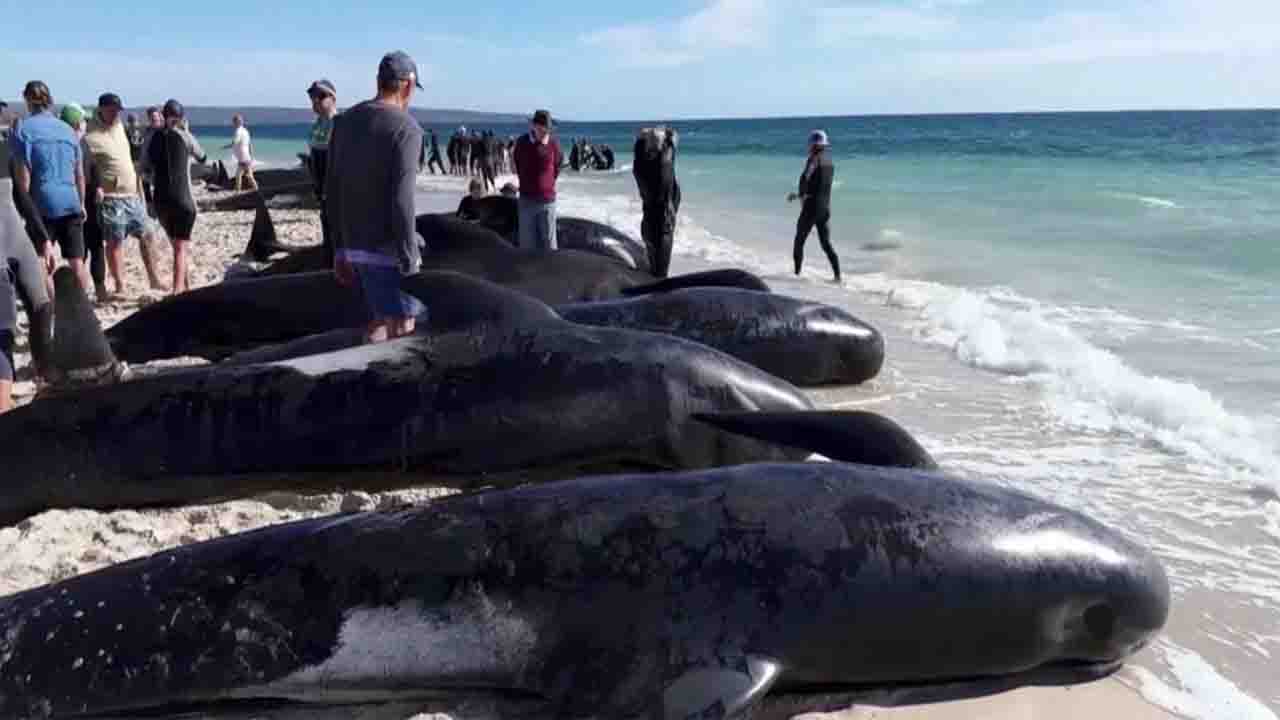At least 26 long-finned pilot whales have tragically perished, while several others have been successfully rescued, following a distressing stranding event that affected approximately 160 whales in Western Australia. The incident unfolded on Thursday morning, with dozens of whales becoming stranded in shallow waters spanning roughly 500 meters at Toby Inlet in Geographe Bay, near Dunsborough. This region, situated less than 250 kilometers south of the state capital, Perth, witnessed a concerted effort by wildlife preservation teams, local authorities, and numerous volunteers who rallied together to aid the distressed marine mammals.
Pia Courtis, acting as a spokesperson for the Department of Biodiversity, Conservation and Attractions, announced that samples would be collected from the deceased whales before their removal from the shores. Despite successful efforts to move over 100 whales offshore, Courtis remained vigilant, cautioning that the whales might return. Ongoing surveillance utilizing vessels and a spotter plane aims to monitor their movements, with periodic searches conducted every couple of hours to track their whereabouts. As of the latest update, the whales have not yet ventured back to shore.
In such instances, where whales are fully beached, the department emphasized the necessity of euthanasia as the most humane course of action. Mass strandings of pilot whales, while not uncommon in Australia and New Zealand, remain a perplexing phenomenon for scientists. Despite decades of study, the precise reasons behind these events elude full comprehension. Some researchers posit that pods veer off course after foraging too close to shore, while others speculate that human-induced underwater noise pollution could disorient these creatures with sensitive hearing.
The highly social nature of pilot whales may also contribute to stranding incidents, as they may instinctively follow podmates into dangerous shallows. Furthermore, wildlife experts suggest that unusual behavior among whales could signal underlying stress or illness within a pod. Pilot whales are known for maintaining close-knit relationships within their pods throughout their lifetimes, which may influence their collective behavior during critical moments.
This unfortunate event adds to a list of previous mass stranding occurrences, including one in New Zealand’s remote Chatham Islands in 2022, where approximately 500 pilot whales perished. Similarly, a mass stranding event took place at Cheynes Beach in Albany, Western Australia, in July 2023, resulting in the death of at least 90 whales. Notably, the largest recorded beaching of whales in Western Australia dates back to 1996, when 320 long-finned pilot whales became stranded in Dunsborough. Remarkably, all but 20 of the animals were rescued and successfully guided back into deeper waters.
Authorities have issued a plea to the public, urging them to refrain from attempting whale rescues without expert guidance. Such actions could inadvertently cause further harm to the animals, disrupt coordinated rescue efforts, or endanger the safety of individuals involved. Instead, they emphasize the importance of allowing trained professionals to lead rescue operations in order to maximize the chances of success while minimizing potential risks.
In conclusion, the recent stranding event underscores the ongoing challenges faced by marine conservationists and authorities in safeguarding the well-being of these majestic creatures. As efforts continue to understand and mitigate the factors contributing to such incidents, collaboration between experts, volunteers, and the public remains crucial in ensuring the preservation of vulnerable whale populations.








